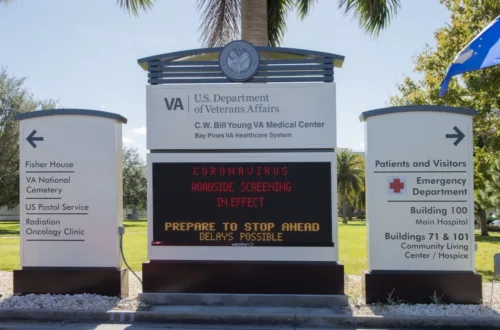Camp Lejeune Water Contamination Linked to Elevated Risk of Parkinson’s

UPDATE: The PACT Act added a list of presumptive conditions the VA considers to be service-connected. Those conditions include medical complications from exposure to water at Camp Lejeune. If you were previously denied a VA claim for a Camp Lejeune-related medical issue, you may file a claim for that condition and have the VA reconsider its original decision.
Learn more: The PACT Act and Your VA Benefits
A study published May 15, 2023, demonstrates a link between a contaminant found in the water at Marine Corps Base Camp Lejeune and a greatly elevated risk of Parkinson’s Disease.
The American Journal of Medicine’s official site reported the publication of this study, noting the risk of Parkinson’s disease was 70% higher in Camp Lejeune veterans compared with troops stationed at Marine bases where the water did not contain elevated levels of industrial contaminants.
The contaminated water at Camp Lejeune has been a controversial topic for decades.
Related: VA and DoD Streamline Disability Claim Exam Procedures
What the Camp Lejeune Water Contamination Study Found
In the 20th century, Camp Lejeune drinking water was contaminated with a known carcinogen called TCE, the likely carcinogen tetrachloroethylene (PCE), and multiple other contaminants which polluted the water supply for 30 years or more from circa 1953 until 1987. Millions of people who lived and worked at the Camp may have been affected.
It should be pointed out that this highly elevated risk of Parkinson’s Disease likely would not have been detected if it weren’t for requirements in the Safe Drinking Water Act.
There have been multiple lawsuits over the Camp Lejeune drinking water issue and with good reason.
One military publication notes that one in every 370 troops who participated in the study “showed signs of (Parkinson’s), a brain disorder that causes uncontrollable movements of the limbs and body. That is significantly above control groups of veterans examined.”
Related: How to Get a VA Toxic Exposure Screening
VA Claims Related to Service at Camp Lejeune
The Department of Veterans Affairs official site says those who served at Camp Lejeune may qualify for VA disability pay. Certain medical issues are presumed to be service-connected, including conditions related to exposure to contaminated Camp Lejeune drinking water.
You may qualify if you served at either Camp Lejeune or MCAS New River in North Carolina for at least 30 days between August 1, 1953, and December 31, 1987.
You must also have a diagnosis that includes one of the following conditions assumed to be service connected with the above service locations and dates:
- Adult leukemia
- Aplastic anemia and other myelodysplastic syndromes
- Bladder cancer
- Kidney cancer
- Liver cancer
- Multiple myeloma
- Non-Hodgkin’s lymphoma
- Parkinson’s disease
VA.gov states, “Evidence shows a link between these conditions and exposure to chemicals found in the drinking water at Camp Lejeune and MCAS New River during this time.”
When you file for benefits related to this issue, the VA asks that you “state that you’re applying for 1 or more of the presumptive conditions for Camp Lejeune.”
Related: Do You Need Help Filing a VA Disability Claim?
PACT Act Provides Legal Recourse
In 2022, the PACT Act, also known as the Promise to Address Comprehensive Toxics Act, provided an avenue of legal recourse for family members and veterans who believe the VA has not sufficiently compensated them for these toxic exposures.
Until the PACT Act, families could not sue the federal government for harm caused by contaminated water or related issues. And since the passage of the PACT Act, many such lawsuits have been filed; so many that some sources report lawmakers considering additional legislation to limit the fees lawyers may charge for representing Camp Lejeune plaintiffs.
History of the Contaminated Water Issue At Marine Corps Base Camp Lejeune
According to the Centers for Disease Control, contamination of drinking water at Camp Lejeune likely began in the 1950s. Some federal agencies have been tracking this issue since the 80s.
According to the CDC, “In 1982, the Marine Corps discovered specific volatile organic compounds (VOCs) in the drinking water provided by two of the eight water treatment plants on base” at Camp Lejeune.
The nature of this contamination? It was “primarily” by PCE (perchloroethylene or tetrachloroethylene.)
What are the origins of this contamination? Some may have come from an off-base dry cleaning company, and the CDC official site says, “Wells that provided water to the base during this period were contaminated by on-base sources, including leaking underground storage tanks, industrial spills, and waste disposal sites.”
The CDC Agency for Toxic Substances and Disease Registry (ATSDR) researched the water issue, stating that PCE concentrations “exceeded the current EPA maximum contaminant level of 5 ppb in drinking water from the Tarawa Terrace water treatment plant for 346 months during November 1957-February 1987.”
According to the CDC, the “most contaminated wells” were taken out of service in 1985.
A “cohort study” of more than 300 thousand servicemembers revealed, “the risk of Parkinson’s disease was 70% higher in Camp Lejeune veterans compared with veterans stationed at a Marine Corps base where water was not contaminated.”
A CDC official site page about this issue reminds us, “As many as one million military and civilian staff and their families might have been exposed to the contaminated drinking water” at the Marine Corps Base.
Related: How to Add Dependents to Your Veteran Benefits
About the author
Editor-in-Chief Joe Wallace is a 13-year veteran of the United States Air Force and a former reporter/editor for Air Force Television News and the Pentagon Channel. His freelance work includes contract work for Motorola, VALoans.com, and Credit Karma. He is co-founder of Dim Art House in Springfield, Illinois, and spends his non-writing time as an abstract painter, independent publisher, and occasional filmmaker.


